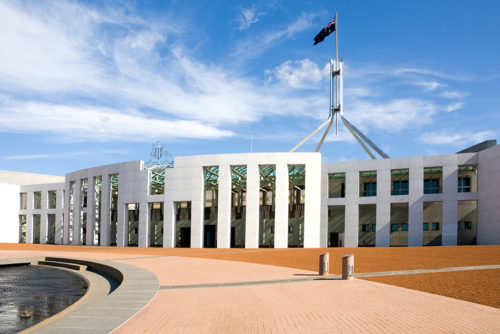 TRUST in government has reached its lowest level on record, with just one in four Australians saying they had confidence in their political leaders and institutions.
TRUST in government has reached its lowest level on record, with just one in four Australians saying they had confidence in their political leaders and institutions.
The ANU’s latest Australian study of the 2019 Federal election also found Australians’ satisfaction with democracy is at its lowest since the constitutional crisis of the 1970s.
Just 59 per cent of Australians are satisfied with how democracy is working.

“I’ve been studying elections for 40 years, and never have I seen such poor returns for public trust in and satisfaction with democratic institutions,” lead researcher Prof Ian McAllister said.
“There is widespread public concern about how our democracy is underperforming.”
Prof McAllister added that the findings were a clear warning the nation’s politicians needed to do better in their efforts to represent and win the confidence of everyday Australians.
“This is a wakeup call,” he said.
“With faith in democracy taking major hits all over the globe, winning back the people’s trust and satisfaction would appear to be one of the most pressing and urgent challenges facing our political leaders and institutions.”
Analysing every major Federal poll since 1987, the latest Australian election study also helps explain the shock 2019 result.
The study found the coalition had a strong advantage when it came to voters’ perceptions on who could manage the economy, tax and leadership, while Labor had the advantage on environmental issues.
“What the study shows is that a key concern for voters was the economy. And this is what tipped the balance in favour of the coalition,” said Dr Jill Sheppard, who worked on this year’s study.
Another factor explaining the 2019 election result is that fewer Australians align with the major political parties.
“The study shows a clear rise in support for minor parties among voters, while 21 per cent of Australians don’t align with any party at all,” Dr Sheppard said.
The study found Scott Morrison was the most popular political leader since Kevin Rudd in 2007.
Bill Shorten was the least popular leader of any major political party since 1990.
“Leaders have always played a major role in shaping voters’ choices and the 2019 election was no exception,” said Dr Sarah Cameron from the University of Sydney and study co-lead author.
“But, the role of leadership in the 2019 election was different from other elections in two respects. First, Bill Shorten’s historically low popularity undoubtedly disadvantaged Labor.
“Second, the Liberals switch from Malcolm Turnbull to Scott Morrison was the fourth time a sitting prime minister had been replaced outside an election since 2010. A majority of voters, 74 per cent, disapproved of this.
“Voters are getting weary of constant changes of prime minister.”
The 2019 Australian Election Study surveyed a nationally representative sample of more than 2,100 voters.
Other key findings from the study include:
- A majority of voters (66 per cent) cast their ballots based on policy issues.
- The most important policy issues for voters were management of the economy (24 per cent), health (22 per cent) and environmental issues (21 per cent).
- Voters preferred the coalition’s policies on management of the economy, taxation, and immigration.
- Voters preferred Labor’s policies on education, health, and the environment.
- More voters indicated that global warming or the environment was the most important issue in casting their vote than at any other point on record.
- Men were much more likely to vote for the Coalition than women (men: 48 per cent; women: 38 per cent).
- Women were more likely to vote for the Greens (men: 9 per cent; women: 15 per cent).
- Gender differences in voting have changed over time. In the 1990s men were slightly more likely to vote Labor than women. In recent elections women have become more likely to vote Labor.
- There is a growing divide between younger and older voters. The 2019 election represented the lowest Liberal party vote on record for those under 35 (23 per cent), and the highest ever vote for the Greens (28 per cent).
- Working class voters are much more likely to vote Labor than middle class voters (working class: 41 per cent; middle class: 29 per cent). Long-term trends show an erosion of Labor’s working class base.
- Asset ownership, including property and shares, was strongly associated with a higher vote for the Coalition.
- For the first time, following the election on the internet surpassed all other media sources, including television.
- Following the 2019 election campaign, more voters saw a major difference between the parties than at any time since 1993.
- The trend towards a more tolerant, inclusive society continued, particularly on moral issues. Support for abortion rights reached its highest level on record (Obtain readily: 73 per cent; In special circumstances: 23 per cent).
- If a referendum were held to recognise Indigenous Australians in the Constitution, 80 per cent responded that they would support this change.
- Support for Australia becoming a Republic has reached its lowest level on record – 49 per cent.
- Since Donald Trump’s 2016 election win, fewer Australians trust the United States to come to Australia’s defence.
Who can be trusted?
In a world of spin and confusion, there’s never been a more important time to support independent journalism in Canberra.
If you trust our work online and want to enforce the power of independent voices, I invite you to make a small contribution.
Every dollar of support is invested back into our journalism to help keep citynews.com.au strong and free.
Thank you,
Ian Meikle, editor





Leave a Reply